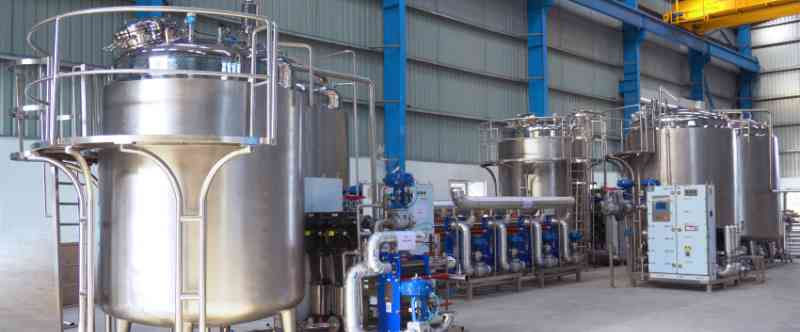A Guide to Evaluating Processing Equipment Suppliers
- alaqua inc
- Jan 15, 2025
- 4 min read
Selecting the right processing equipment supplier is a pivotal decision that significantly impacts the efficiency, quality, and overall success of your operations. A reliable supplier goes beyond merely providing machinery; they play a crucial role in ensuring seamless integration, optimal performance, and long-term productivity. Moreover, their expertise in offering professional equipment services directly influences operational consistency, minimizing downtime, and maximizing output.
Furthermore, choosing the right partner means investing in a relationship that supports your business growth by delivering high-quality equipment, innovative solutions, and dependable after-sales services. Ultimately, the right supplier helps enhance your profitability and competitive edge in the industry.
This comprehensive guide delves into the critical factors to consider when evaluating processing equipment suppliers, ensuring you make an informed and strategic choice.

Comprehensive Guide to Evaluating Processing Equipment Suppliers
1. Assess Your Specific Needs
Start by thoroughly identifying your processing needs, including capacity, material compatibility, regulatory compliance, and specific operational objectives.
Capacity: The volume of production the equipment needs to handle.
Material Compatibility: Suitability of the equipment with the materials you process.
Regulatory Compliance: Adherence to industry-specific standards and regulations.
A thorough understanding of your needs will guide you in selecting a supplier capable of meeting your specific demands.
2. Evaluate Industry Experience and Expertise
A supplier's extensive experience within your industry is invaluable for understanding unique challenges and delivering tailored, effective solutions. Consider:
Track Record: The number of years the supplier has been operational and their history within the industry.
Specialization: Expertise in manufacturing equipment tailored to your specific processing needs.
An experienced supplier is more likely to understand your unique challenges and provide effective solutions.
3. Examine Product Quality and Standards
High-quality equipment is essential for operational efficiency and longevity. Assess:
Manufacturing Standards: Adherence to recognized quality standards and certifications, such as ISO 9001.
Durability and Reliability: The lifespan of the equipment and its performance under operational conditions.
Therefore, investing in quality equipment minimizes downtime and maintenance costs.
4. Consider Technological Innovation
The pace of technological advancement necessitates equipment that incorporates the latest innovations. Evaluate:
Up-to-date Technology: Availability of the latest features that enhance efficiency and productivity.
Research and Development: The supplier's commitment to continuous improvement and innovation.
So, advanced technology can provide a competitive edge in your operations.
5. Assess Customization and Flexibility
Your processing needs may require tailored solutions. Determine:
Customization Options: The supplier's ability to modify equipment to meet your specific requirements.
Scalability: Flexibility to accommodate future growth or changes in your operations.
Therefore, a supplier that offers customization can provide a plantation of processing equipment that integrates seamlessly into your processes.
6. Review After-Sales Support and Services
Comprehensive support is crucial for maintaining equipment performance. Therefore, investigate:
Technical Assistance: Availability of expert support for troubleshooting and maintenance.
Training Programs: Provision of training for your staff on equipment operation and maintenance.
Spare Parts Availability: Ease of obtaining replacement parts to minimize downtime.
So, reliable after-sales support ensures sustained operational efficiency.
7. Analyze Pricing and Total Cost of Ownership
While initial cost is a consideration, focus on the total cost of ownership (TCO). Consider:
Initial Investment: Upfront cost of the equipment.
Operating Expenses: Energy consumption, maintenance, and repair costs over time.
Depreciation and Resale Value: The equipment's value retention over its lifespan.
A lower initial cost may not equate to long-term savings. Furthermore, evaluate the TCO for a comprehensive financial assessment.
8. Verify Compliance with Regulatory Standards
Ensure the supplier's equipment complies with relevant regulations to avoid legal complications. Check for:
Industry Certifications: Compliance with standards pertinent to your industry.
Safety Regulations: Adherence to safety protocols to protect your workforce.
Therefore, compliance is essential for legal operation and safety assurance.
9. Investigate Supplier Reputation and References
A supplier's reputation provides insight into their reliability and quality. Seek:
Customer Testimonials: Feedback from previous clients regarding their experiences.
Case Studies: Examples of successful implementations similar to your needs.
Industry Standing: Also, recognition or awards within the industry.
Positive references and a solid reputation are indicators of a trustworthy supplier.
10. Evaluate Financial Stability
A supplier's financial health affects their ability to deliver and support their products. Assess:
Business Longevity: Duration of operation and growth trajectory.
Financial Records: Availability of financial statements indicating stability.
A financially stable supplier is more likely to provide consistent support and honor warranties.
11. Consider Geographic Location and Logistics
The supplier's location can impact delivery times and support availability. Consider:
Proximity: Closer suppliers may offer faster delivery and support.
Logistical Capabilities: Efficiency in handling shipping, installation, and maintenance services.
Efficient logistics contribute to smoother implementation and reduced downtime.
12. Assess Environmental and Sustainability Practices
Sustainable practices are increasingly important in today's industrial landscape. Therefore, evaluate:
Eco-Friendly Equipment: Availability of energy-efficient and environmentally friendly machinery.
Sustainable Manufacturing: The supplier's commitment to sustainable production methods.
Aligning with suppliers who prioritize sustainability can enhance your corporate social responsibility initiatives.
13. Review Contract Terms and Conditions
Before finalizing any agreement, thoroughly review contract terms. Further, pay attention to:
Warranties: Coverage offered for the equipment.
Liability Clauses: Protection in case of equipment failure or delays.
Payment Terms: Flexibility and transparency in pricing and payment schedules.
Understanding the terms ensures clarity and prevents potential disputes.
Final Thoughts
Evaluating processing equipment suppliers is a critical step in ensuring operational success. Further, by considering factors such as quality, technological innovation, customization, and after-sales support, you can identify a partner who aligns with your business needs. Remember, the right supplier is not just a vendor but a collaborator in achieving your long-term goals.
If you are looking for a processing equipment supplier, look no further than AlaquaInc. The trusted processing equipment supplier specializes in innovative and reliable solutions for various industries. Moreover, with a commitment to quality, sustainability, and exceptional professional equipment services, AlaquaInc offers a wide range of equipment, including evaporators, distillation units, and heat exchangers. Therefore, ensures operational efficiency and long-term productivity for its clients.



Comments